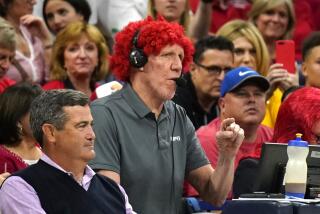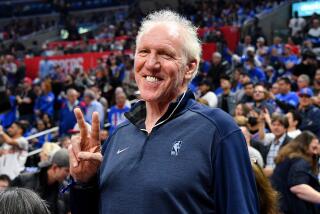Walsh’s Return Humbling and Rewarding
- Share via
ROCKLIN — From Day 1, Bill Walsh hasn’t liked his job title. Somehow, administrative assistant to the coaching staff just doesn’t measure up to his image--or his resume.
Then again, just what in the world is a Hall of Fame coach and three-time Super Bowl winner doing taking a job as an assistant with the San Francisco 49ers, the club he built into the team of the 1980s?
To some degree, it’s merely that Walsh felt he needed the 49ers and that the 49ers believed they needed him.
So Walsh is back with the team in an unlikely role, working under George Seifert, who has taken San Francisco to two Super Bowl titles of his own in the seven years since succeeding Walsh.
Walsh, 64, considers his job title lowly--he would prefer to be called a consultant--but he also regards it as an annoyance he can put up with in return for the satisfaction derived from rejoining the 49ers.
“It’s exhilarating, really, from the standpoint of watching the athletes and the coaching that’s going on, watching the team being put together and then adding whatever counsel I can add or offer to the coaches and occasionally the players,” Walsh said. “It’s good to be part of a great organization again, not that I’ve ever really been separated from it. But now it’s more official.”
Over the last few months, Walsh has worked extensively with Steve Young and the other quarterbacks on their techniques. During training camp, Walsh was out on the field daily, observing practice, scribbling his thoughts in a tiny notebook, then sharing them with the coaches.
Walsh says he won’t be calling the shots or the plays like he did in his 10 years as 49ers coach, but at this stage in his life he wouldn’t want it any other way.
“I don’t have any agenda of looking for more responsibility and power,” Walsh said. “I don’t have that. I don’t want that. So it’s up to me to do the best I can to help.”
For their part, the 49ers are hoping the power of Walsh’s presence--not to mention his suggestions--aids the team in its bid to get back on a championship track.
“I expect it to be a positive thing,” said Seifert, who has referred to his former boss as a historian, observer and resource but never as administrative assistant. “Otherwise, we wouldn’t have done it.”
San Francisco brought Walsh back after last January’s divisional playoff loss to Green Bay, a defeat that denied the 49ers a return trip to the Super Bowl and also exposed their vulnerabilities as a heavily pass-oriented team.
Club president Carmen Policy said there was a sense San Francisco’s offensive system, originally installed by Walsh in 1979, had strayed from its roots, diluted by time, tinkering and a succession of offensive coordinators. Mike Holmgren and Mike Shanahan, now head coaches in Green Bay and Denver, ran the offense in the 1990s before Marc Trestman took over prior to last season.
“Bill’s role is to help Marc bring us back to the basics of the West Coast offense,” Policy said.
One thing the move does is heighten expectations for the 49ers. It also puts more pressure on Seifert, who rebuffed an effort to bring Walsh back four years ago, and Trestman, who initially viewed Walsh’s return as a threat to his job.
Trestman went so far as offering to resign, but Policy convinced him to stay, assuring him he would retain game-plan and play-calling authority. Although Walsh will sit in the press box with Trestman during games, it will be in an advisory capacity only.
“Initially it was a very difficult situation for me because of when it happened, the timing of it and everything,” Trestman said. “Once I thought through it, I talked to Carmen, talked to George about it, and I realized it was a tremendous opportunity personally to spend a year with him, get his feedback and have him as a resource.”
As much as Walsh’s return holds the potential for reward, Trestman conceded there is some risk the whole thing could fall apart.
“It’s not an easy situation for any of us, because the dynamic is much different than anywhere else,” he said. “This has never happened. You can’t draw parallels in any sports situation like this.
“You could put a Sid Gillman or anybody like that (in an advisory role), but nobody has ever had this position with the legacy of a Bill Walsh, in my opinion, and his relationship with the administration, the organization, management, George, me. It’s never happened. So you’ve got to have some people that are very sensitive for it to be able to work out, and I think we have those people.”
Seifert acknowledges that the notion Walsh was brought back to fix a listing team creates a certain amount of pressure. But if the move helps the 49ers win, so be it.
“We just have to do what we think is going to help us,” he said. “I mean, there’s fingers pointed at me, too. That’s just part of the deal. That’s just part of the business. And it can be a motivating thing. It’s not all that bad. Sometimes you don’t like it, but it gets your attention, I guarantee it.”
Walsh said he’s determined to make his relationship with Trestman work by maintaining a subordinate posture.
As for his relationship with Seifert, Walsh said: “It’s been no problem. Of course, we’re both strong-minded and committed people, but I’ve never had a cross word with George Seifert.
“I think George is dealing with having my presence very well, and I’m staying clear of being in a high-visibility role, so he trusts me and I trust that he wants me, so it works out fine.”
Walsh views his coaching-consultant role as a single-season venture, but he hopes to continue with 49ers in some front-office capacity next year. For now, he’ll just walk the line between providing expertise and staying out of the way.
“I’m not going to be the person inspiring the team or motivating the team or calling the plays,” he said. “When those kinds of things are being done, typically I’m not there. It’s not as though, ‘Walsh is here, now we’re inspired.’
“Before the game, I won’t even be in the locker room when George is talking to the team. At halftime, Marc will be giving them the adjustments. I won’t be there. I’m a football resource. It would be awfully hard to measure what I do.”
More to Read
Go beyond the scoreboard
Get the latest on L.A.'s teams in the daily Sports Report newsletter.
You may occasionally receive promotional content from the Los Angeles Times.










